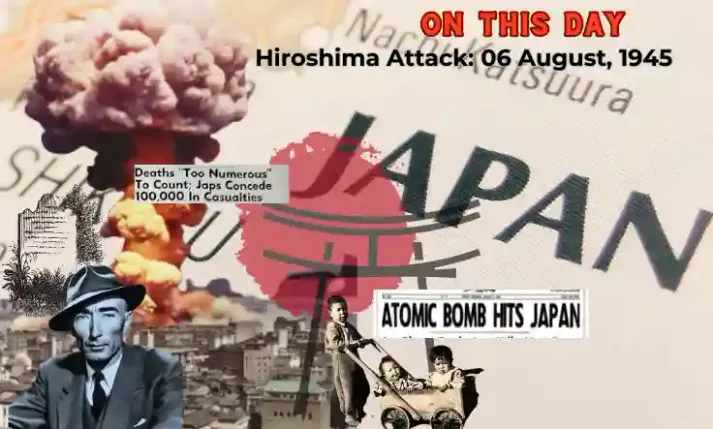To commemorate the biggest loss this Asian Country 78 years back today, at 7:30 pm, downtown churches will ring bells 78 times with the citizens gathered near St. George’s Cathedral, 270 King St E, and then proceed to St. Andrew’s Church, 130 Clergy St. at Princess.
It was the time of the second world war, Countries were burning in the same rage that was held between Japan and America. Among all the attacks and counterattacks no one would’ve seen a major destruction coming towards Japan soon.
The Morning of 6th August was as usual till 8:15 AM August 1945. It took 43 seconds when the first atomic bomb little boy grazed at the City of Hiroshima while coming close and closer to it. In a Flash, 80,000+ people lost their lives in a city that was home to 3,00,000 people.
Today this horrifying incident completes 78 years and still symbolizes the dark day in human history.
During the time of the war, Japan was unwilling to surrender. This nuclear holocaust shattered the spirit of the nation and finally, the world war came to an end.
Oppenheimer pressed the button
There was a time when Einstein realized what could be possible after the effects if the destruction with nuclear energy began. He warned the political powers behind this but seems the Nuclear race had to commence.
The recent popularized film behind “The Father of Atomic Bomb”- Robert J. Oppenheimer, sheds light on the life of an American Scientist describing how and why atomic bombs developed during World War II.
The Atomic Bomb was developed as a part of the Manhattan Project that began in 1942. The government of the United Nations wanted to develop this destructive weapon before any other nation could.
The history of the development of the atomic bomb is represented in three hours devoted to the testing of the atomic bomb during World War II, where he understood that the explosion would ignite the atmosphere and destroy the world, yet he went ahead.
Despite Oppenheimer's political inclinations, they did not hinder his recruitment in early 1942 for a confidential project sanctioned by President Franklin D. Roosevelt. This endeavor was attracting scientists from across the nation. Albert Einstein had penned a letter to Roosevelt three years prior, cautioning about the potential for "highly potent bombs of a novel nature" through nuclear fission advancements. At present, a competition was underway to ascertain the methodology for constructing such a bomb ahead of Germany.
G7 Summit that speaks on Nuclear Disarmament.
Nine countries today have nuclear power, namely the United States, Russia, France, China, the United Kingdom, Pakistan, India, Israel, and North Korea.
At this point, the world is facing another rage between Russia and Ukraine which nations around the world want to end. With a similar fear about another face of destruction.
This year G7 summit which was hosted by Japan took place in Hiroshima City. Its commemoration aligns with increased apprehensions regarding the potential for nuclear conflict, prompted by ongoing tensions between Russia and Ukraine. The "Doomsday Clock," under the scrutiny of the Bulletin of Atomic Scientists, presently registers at 90 seconds to midnight, marking the closest proximity to a worldwide catastrophe it has ever indicated.
The nine working sessions focused on the following key matters:
Addressing Russia's actions against Ukraine
Advancing nuclear disarmament and preventing proliferation
Examining the global economy, finance, and sustainable development
Tackling challenges related to climate change, energy, and the environment
Ensuring food security and promoting health
Strengthening collaboration with international partners
Selecting Hiroshima as the host city for the G7 Summit underscores Prime Minister Kishida's dedication to prominently featuring nuclear disarmament and nonproliferation on the meeting's agenda. On August 6, 1945, Hiroshima became the first city worldwide to experience the impact of a nuclear weapon.
The reduction and elimination of nuclear weapons not only mitigate the potential for catastrophic conflicts but also foster an environment of trust and cooperation among nations. By prioritizing nuclear disarmament, nations exemplify their dedication to a more peaceful and secure global landscape, where the specter of nuclear devastation is progressively diminished.
Written by: Kratika Agrawal
Also, Read: Pyaar mei junoon hai par dosti mei sukoon hai - Happy Friendship Day 2023







